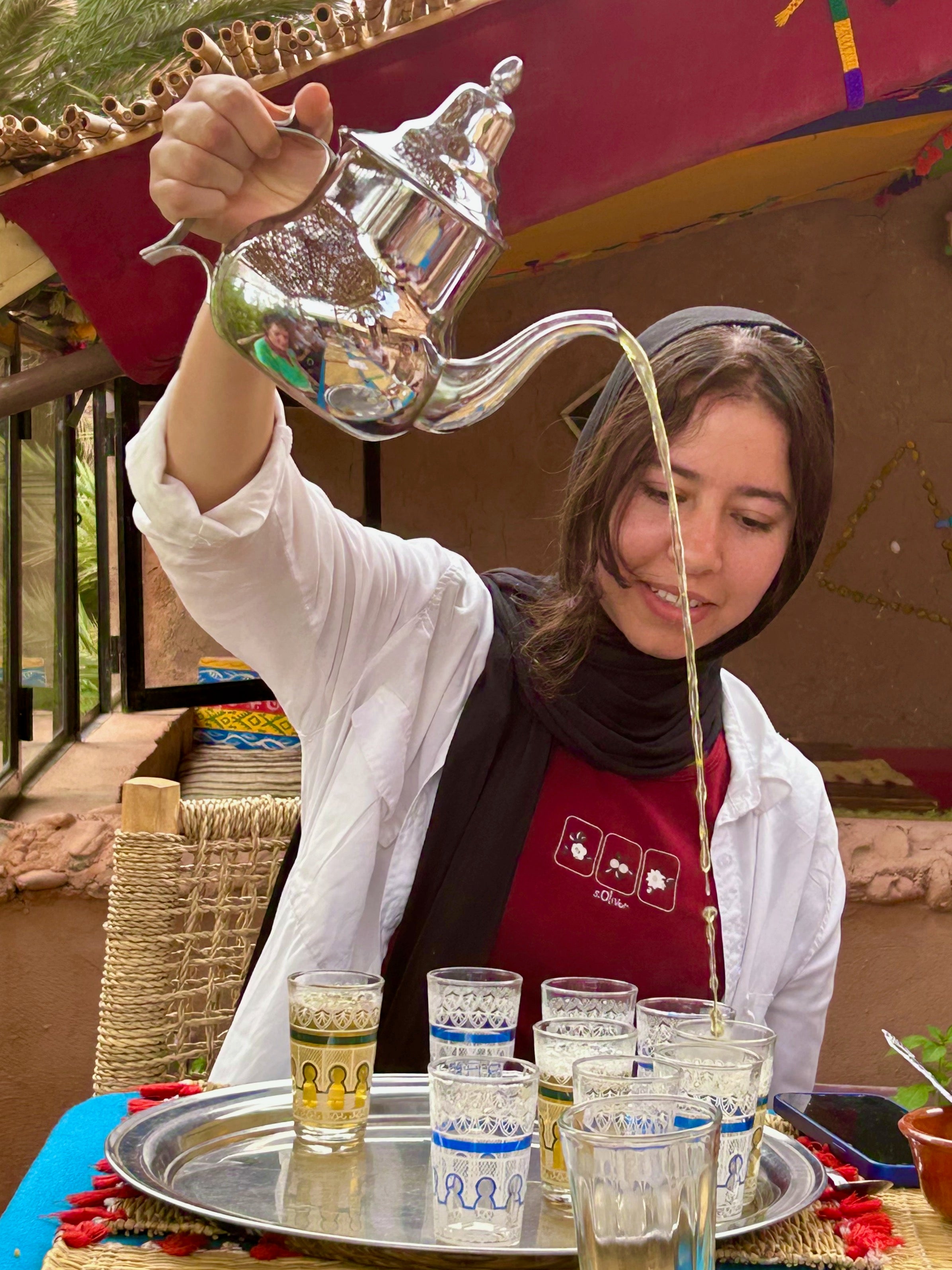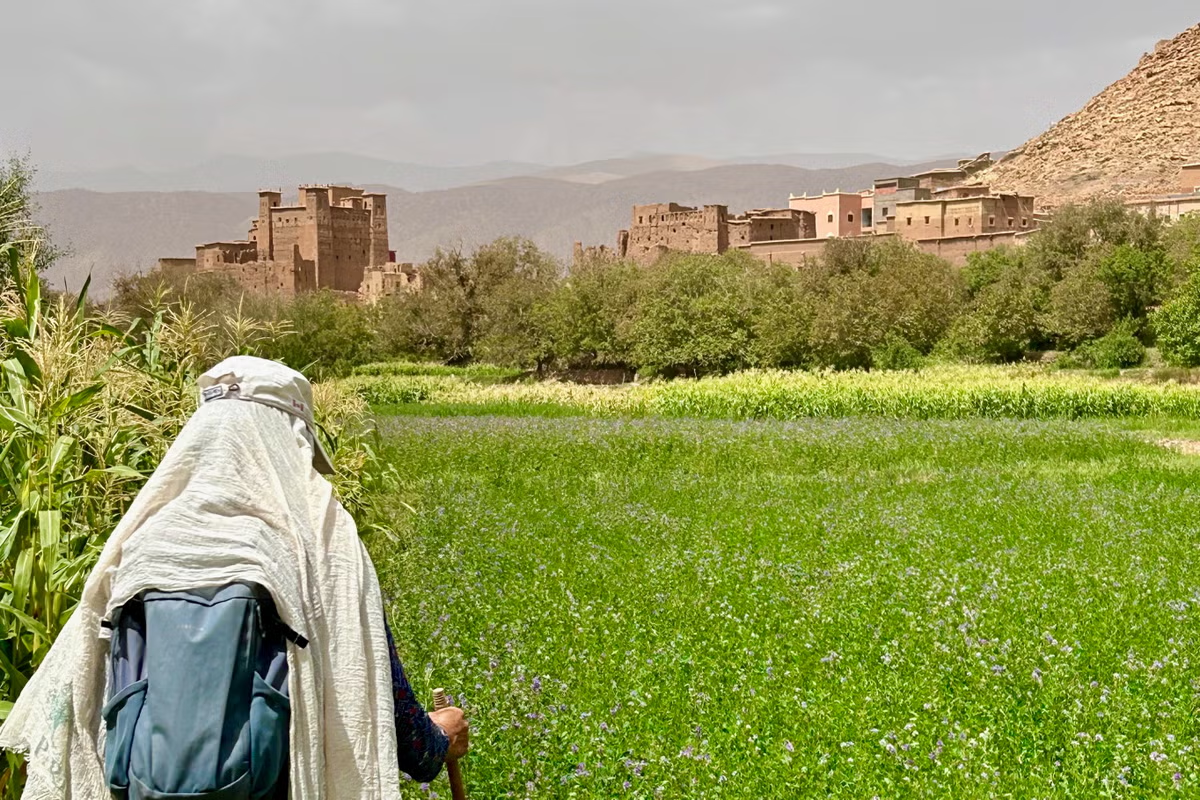Latifa, your Arabic name,” Mama Bia announces. As I’ve come to learn, everyone pays attention to Mama Bia. Offering me one of her infectious smiles, she grabs the bellows and pumps them rapidly at the fire, conjuring crackles and a cloud of smoke. Keen to serve the brewing mint tea, she lifts the metal teapot to head height, pouring a satisfying splatter into the tea glasses.
In this dimly lit room with solid mud walls and a dusty floor covered in woven mats, I pass the frothy tea around to my thirsty companions. They are busily chopping vegetables on low-rise plastic tables, fascinated by our guide Hanane Yachou aerating the couscous. Instant couscous isn’t a thing here.
I’m embracing rural life in the M’Goun Valley, a lesser-visited area of the High Atlas mountains and a seven-hour drive east of Marrakech. Along with eight women, I’ve joined Intrepid’s women’s expedition, in the heart of an Amazigh community (pronounced am-uh-zeekh) where I’m promised immersion into rural life, hiking between villages and staying in small guesthouses.
Just over a year ago, an earthquake struck 100 miles away, claiming 3,000 lives and leaving countless homeless. Some residents are still waiting for government aid for the reconstruction of their homes and businesses.
“Women were more impacted,” explains Zina Bencheikh, Intrepid’s managing director for Europe, the Middle East and Africa, “As they still carried the responsibility for the children and elderly, the house, and making sure there was food on the table”.
Morocco is encouraging travellers to return to support the country’s recovery, and I’m curious about how women’s roles in tourism can positively impact their livelihoods.
“Yellah,” shouts Mama Bia. I assume she’s shouting “let’s go” to the group, not the mules loaded with backpacks and provisions, nor our three muleteers, Malika (one of a few female muleteers), Mohammed and Bassou. Thrown into a rural motorway through the woods, women strap bundles of alfalfa and grasses onto their backs for their livestock, while teenage boys bang trees in the hope of a healthy harvest of walnuts and figs. The rhythmic Tamazight language reverberates across the fields.

Not all villagers have embraced women working as tour guides (Yvette Cook)
Over the next four days, we walk 30 miles across the valleys. Footpaths weave through a vivid green oasis of fruit trees and farmland, sandwiched between rugged ochre mountains and camouflaged kasbahs (fortresses). Our feet are soothed as we wade through the rippling waters of the Agouti Gorge, the rusty limestone cliffs peering over us like ancient giants. In the evenings, we are treated to hands-on experiences with local women, patient as we clumsily learn how to spin wool, thread rugs, and bake the round khobz bread that accompanies every meal.
Unseasonal rains hit overnight, affecting our planned route. Mama Bia takes us on a necessary arduous trek to avoid the floodwaters, over rock-strewn Martian hills, glistening with silver slithers of water. Sheltering in nomadic caves from the oppressive sun, we reflect on our collective strength, willing each woman to complete the journey.

The M’Goun Valley is an area of the High Atlas mountains less visited by travellers (iStock)
Mama Bia’s determination doesn’t waver. She leads us along age-old routes at a steady pace, pausing to reap the harvest of wild peaches or probe the depths of watercourses with her wooden walking stick. Her slight stature belies her strength as we admire her scaling a small cliff in her djellaba dress and New Balance trainers, shouting “yellah” from the peak.
As the first female guide, a role considered inspirational by some and shameful by those stuck with conservative views of women, Mama Bia is an unusual figure in the M’Goun Valley. Female villagers greet her by exchanging kisses and placing their hands over their hearts, gesturing respect, sincerity and warmth. They recognise her sacrifice, yet she is humble. At the age of 54, she appears to have led a fulfilling life, her soft, gentle features hardened by the customary tattoo of a fish on her chin and a map of wrinkles that hint at incredible stories.

Local cuisine made up of fresh vegetables, lentis and khobz bread (Author’s own)
While resting over a modest lunch of lentils, carrots and khobz, I ask Mama Bia what she enjoys most about being a guide. “Everything”, she declares, her vagueness initially disappointing me. Yet her perpetual joy is clear, from how she embraces the freedom of each hike, to cherishing each human encounter, to her playful eye-rolling at the incessant selfie taking.
But what single change would she make? Expecting her to say “nothing”, she surprises me with “travel”. This prompts offers of hospitality from the group and I’m left wondering how it must feel to host people from far-off lands, with limited prospect of visiting them yourself.
Mama Bia is not the only woman in Morocco forging change. The High Atlas Foundation places women’s empowerment centre stage, enabling significant increases in cooperatives that sell high-quality argan oil, natural cosmetics, handicrafts and organic food. One rose oil cooperative does particularly well out of our tour group. Each Moroccan dirham that tourists spend in the cooperatives directly improves women’s economic independence.

Only 4 per cent of tour guides in Morocco are women (Yvette Cook)
However, Hala Benkhaldoun, Intrepid’s general manager in Morocco, tells me that “while 25 per cent of the Moroccan workforce is female, only 4 per cent work as tour guides and we started to ask ourselves where the women were”.
The root of the tourism sector’s gender imbalance is girls’ education. It’s estimated that over 80 per cent of rural women are illiterate, so before my tour, I visited a boarding house set up by the charity Education for All. It’s a homely environment with academic support that enables girls from remote villages to attend and thrive at secondary school, though progress has temporarily slowed since the earthquake destroyed five of its six homes.
Nevertheless, since being founded in 2007, 650 girls have completed their baccalaureate with high pass rates. Many have progressed to university, equipping them with skills and opportunities they otherwise would never have had, three are employed by Intrepid. By raising awareness of these worthy causes and encouraging its travellers to donate, companies such as Intrepid strive for tourism to have a positive impact.

Peak performance: picturesque views of the High Atlas mountains (Yvette Cook)
So it’s no surprise that in Paige McClanahan’s book, The New Tourist, she sees travel as a social good. Her view is that “the new tourist is humbled by her travels” and “embraces the chance to encounter people whose backgrounds are very different from her own, and to learn from cultures or religions”.
On our final night in the M’Goun Valley, this is exactly what we do. Mama Bia, Hanane and Malika, along with local children, take great pleasure in adorning us in sequined Amazigh dresses and headscarves. Kohl eyeliner complements the henna tinting our hands; the mesmerising beat of the riq, or tambourine, lures us into the earth-coloured courtyard.
Performing a wedding ritual, it is our turn to be the centre of attention. Malika hurries towards me and grabs my hand to join the line of the women standing opposite the men. Rhythmically rocking our feet from side to side, the women and men take turns to sing to one another in Tamazight. Even though my Tamazight is limited, at best, I join in using sounds, accuracy doesn’t seem to matter. Only joy and laughter matter as they fill the courtyard and embolden onlooking staff and guests to join in.

The root of the tourism sector’s gender imbalance is girls’ education; it’s estimated that over 80 per cent of rural women are illiterate (Yvette Cook)
Latifa, the Arabic name Mama Bia assigned me, means kind, a feeling that follows me on my journey. Kindness is a value that plays a crucial role in women’s empowerment, cultivating solidarity, building confidence and fostering a culture of inclusivity. As Mama Bia leads us in dance, I appreciate how the language of kindness, through empathy, hospitality and moral support, has created connections across cultures, and how two-way tourism is a force for good.
Yvette travelled with Intrepid on their 8-day Moroccan Women’s Expedition which starts in Marrakech and costs from £955. Intrepid offers flight-free transport to Marrakech. Alternatively, direct flights can be taken from London, Bristol, Birmingham, Manchester, Glasgow and Edinburgh.
Read more: Where to go on holiday in Morocco, from Marrakech to Fes
